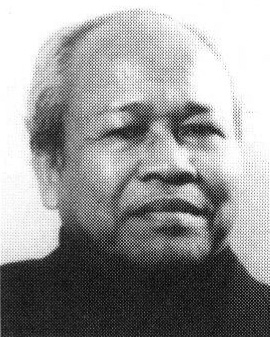Sacred Vows
U Sam Oeur
Translated from the Khmer by Ken McCullough and U Sam Oeur
Coffee House Press: Minneapolis, 1998
226 pp.; $15.00 (paper)
 This collection of poetry dates from the early fifties almost to the present day. U Sam Oeur wrote these poems in traditional Cambodian forms, which are sometimes replicated in the translations with the oddly graceful effect the reader will notice below. Sacred Vows is a significant human, Buddhist, and poetic creation.
This collection of poetry dates from the early fifties almost to the present day. U Sam Oeur wrote these poems in traditional Cambodian forms, which are sometimes replicated in the translations with the oddly graceful effect the reader will notice below. Sacred Vows is a significant human, Buddhist, and poetic creation.
Born in 1936 and raised on a prosperous farm, Sam came to the United States to study industrial arts. Almost accidentally his talent for poetry was discovered, and he earned a degree at the Iowa Writers’ Workshop in 1968. Intensely matriarchic, Sam regards Cambodia as a sacred Buddhist land. When he was sixteen he bemoaned his country’s suffering, and in “Oath of Allegiance” vowed:
I shall never betray you
my motherland
I was born from your womb
and I shall pay my debts
to the shade where I’ve rested
the shade of the thlok tree
where Gautama had once sat
Because of his concern for Cambodia, Sam returned there to serve in the military, work in industry, and later serve in Parliament. In the first poem in Sacred Vows, “Prophecy,” he describes a crumbling Cambodia:
And now everything goes haywire . . .
Dried gourds sink in the paddy fields,
while broken dishes are afloat everywhere;
this is called social upheaval
Events further deteriorated when the Khmer Rouge took control of Phnom Penh in April 1975. Sam, his family, and virtually all the nearly two million residents of the city were driven out with only what they could carry or drag in carts. In “The Fall of Culture,” he describes leaving his home:
O, home! home! the sacred ground where we lived happily,
the heritage built, bit by bit, by my father,
O, the Naga fountain with its seven heads,
preserving our tradition from days gone by.
O, monument of independence! O, library, O books of poetry!
I can never chant the divinely inspired poems again!
O, quintessential words of poets!
O, artifacts I can never touch or see again
Sam’s wife, son, and mother survived the next four years in six different concentration camps, but camp ‘midwives’ murdered his newborn twin daughters before their own eyes:
Very pretty, just as I’d wished, but those fiends
choked them and wrapped them in black plastic.
Where it was death to be an intellectual, he played the role of an illiterate bumpkin, looking at words backwards or upside down and reading them in outrageous ways. He hid his education with the agricultural skills he had learned as a rural youth. Once, while he was actually eating his ‘last meal’, he was saved from immanent execution for losing a water buffalo entrusted to his care only by that animal’s fortuitous return. His captors teased him:
“Grandpa gold is lucky! He almost
traveled to the white bones village.”
I feign not knowing what they mean
and keep stuffing myself with rice.
The poems describe a journey through the Hells. The Buddhist concept of Hell most nearly conforms to that of the Roman Catholic and Orthodox concept of Purgatory, since for Buddhists there is always an end to every being’s time of suffering. Because the poems of U Sam Oeur so deeply reflect the ultimate victory of understanding and compassion over the greatest evils imaginable, they equally deeply reflect the final hope and certainty of ultimate salvation that the Buddha’s teaching offers every sentient being. This is the inevitable corollary of Sam’s final statement in Sacred Vows: “Every strand is precious in the web of life.”
Though the torments of Purgatory may be exquisite indeed, there are always angels, hovering over the burning lake, finally able to offer salvation. The presence of the spirits was constant during Sam’s abysmal journey. His deep faith reflects his hope beyond hopelessness, and the visibility of the invisible. In these poems the spirits and angels hover above Sam, and he knows they are there. When he walks to the Mekong to bury his twin daughters, murdered in the very act of being born, he prays not for them but to them:
Even though I’ll bury your bodies here,
may your souls guide me and watch over your mother.
Lead us across this wilderness
And light our way to the Triple Gem.